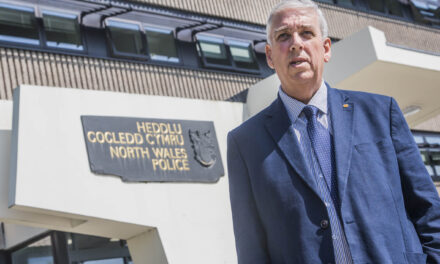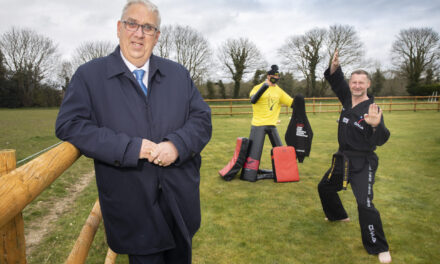Welsh rugby legend Ray Gravell has been revealed as the mystery figure who anonymously paid a fine to release iconic singer Dafydd Iwan from prison early.
Big hearted Ray, from Mynydd y Garreg, in Carmarthenshire, who played for Llanelli, Wales and the British and Irish Lions, was determined to keep the news secret until after his death.
His wife, Mari, was under strict orders not to tell Dafydd, who had been jailed following a Cymdeithas yr Iaith (Welsh Language Society) protest, about it until after he had passed away in case the singer was upset with him.
The revelation is contained in the new autobiography written by the folk singer and Welsh nationalist campaigner, Dafydd Iwan: Still Singing Yma o Hyd, that’s due to be launched on November 9.
Dafydd Iwan was born in Brynamman, Carmarthenshire, in August 1943. One of four boys, his siblings include the late actor Huw Ceredig and the politician Alun Ffred Jones.
His musical career started in the mid-1960s and before the decade was out he was receiving television coverage both for his music and for his political activities as a member of Cymdeithas yr Iaith.
He was imprisoned in 1970 for his refusal to pay fines for defacing English only road signs as part of the fight for Welsh language rights.
During his first spell in prison in Cardiff he met Cayo Evans, one time leader of the radical political group, the Free Wales Army , who acted as his “prison minder”.
Cayo Evans, from Silian, near Lampeter, was one of three men convicted of conspiracy to cause explosions and other public order offences following a lengthy trial and jailed by a judge and had been handed lengthy sentences at Swansea Assizes on the same day as Prince Charles was invested as Prince of Wales.
“Julian Cayo Evans was given a 15-month sentence so was still in Caerdydd Prison when I arrived. Cayo was a colourful character and had the attributes of a natural leader of men, and during his stay in prison, he had become a firm favourite with the other inmates,” Dafydd said.
“He soon took on the role of being my unofficial guardian, and every day he would bring me a copy of the Western Mail so I could keep up with all the protests that were planned to coincide with my imprisonment.”
Imprisoned for a second time, Dafydd was released when the outstanding fine was paid by a mystery figure whose identity is revealed in the book as beloved Welsh rugby star Ray..
He was a great fan of Dafydd Iwan, singing his songs constantly in the dressing room and they became great friends.
Dafydd said after Ray’s untimely death, his wife Mari told him he had warned her that she should never disclose something until after he had gone.
“And that is the fact that my imprisonment had such an impact on him that he couldn’t bear the thought of me being in prison, and my wife and children at home without me.
“So he had decided to pay my fine, and he was on the phone for hours, asking how this could be done, and managed to get the money sent to Walton. And that’s how I came to be released against my wishes!
“It’s so typical of Ray, a man who always wore his heart on his sleeve. How I wish I could have thanked him and put his mind at ease that I didn’t really mind at all. Dear, passionate Ray Gravell – a Welshman like no other,” said Dafydd.
In the book, Dafydd also claims an agent provocateur tried to lure him into a fake plot to assassinate King Charles when he was the Prince of Wales.
He says the bizarre incident happened during the run-up to the investiture of the then Prince of Wales, now King Charles, at Caernarfon Castle in July 1969 when his satirical song, “Carlo” (Charles) was riding high in the Welsh pop charts.
Noting that every government tend to use “unnecessarily heavy-handed methods to carry out their surveillance” he said passions surrounding the impending Investiture were at their height when he “experienced at first hand a rather pathetic attempt by an agent provocateur to put me in a great deal of trouble.”
He recalled: “I arrived at a concert in Llanrwst to find the place crawling with police, and two of them approached me to say they’d received intelligence that someone was out to kill me, so they were there in numbers to give me protection.
“I was ushered into the marquee where the concert was to take place and shown into a small room in a corner of the tent. ‘We will be outside if you need us’, they told me.
“As I sat there, trying to come to terms with what I’d just heard, and getting the guitar ready for the stage, a man came in, looking like a character from a B movie, and said in a hushed voice that we’d met previously at a Plaid do in Holyhead. I’d never seen him before, and never saw him again.
“He said that he had very little time, so he wanted to come straight to the point. ‘We have a plan to assassinate the Prince, and you are the very man to help us’.
“I did not let him finish his sentence but told him to get out as quickly as his feet could take him and added that I didn’t ever want to see him again.
Dafydd Iwan was one of the founders of Cymdeithas Tai Gwynedd (Gwynedd Housing Association) in 1971 and was involved in other projects to provide homes for the local population in north-west Wales.
With fellow folk singer Huw Jones, he was also one of the founders of Recordiau Sain (Sain Records), now one of the main Welsh music labels with its own state-of-the-art recording studios in Llandwrog. He remains one of the company’s directors.
For many years Dafydd Iwan was a Plaid Cymru councillor in Gwynedd and his long service to the Welsh language led to his being made an honorary member of the Gorsedd of Bards at the National Eisteddfod at Bangor in 1971.
His autobiography will be launched at the first of a series of celebratory gigs at Galeri Caernarfon. The concerts will inevitably feature “Yma O Hyd” (“Still Here”) which was released in 1983 to “raise the spirits, to remind people we still speak Welsh against all odds. To show we are still here”.
Since then the song has become an official Welsh anthem for the Wales national football team.
Last year the song was sung live by Dafydd Iwan before Wales’ last two games of their first successful FIFA World Cup qualification since 1958.
The performance and Wales’s qualification led to the song returning to number one in the UK iTunes chart.
In July 2023, Iwan was awarded an honorary degree from Bangor University, in Bangor, Gwynedd, for his “contribution to Welsh Culture, Language, Music and the Arts.”
Dafydd Iwan: Still Singing Yma o Hyd is published by Y Lolfa, price £9.99.










